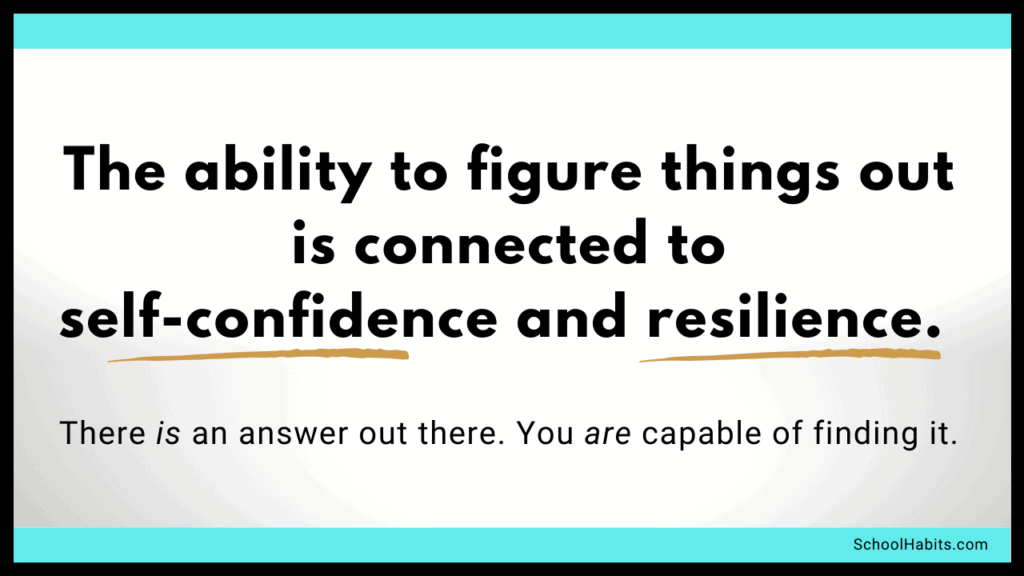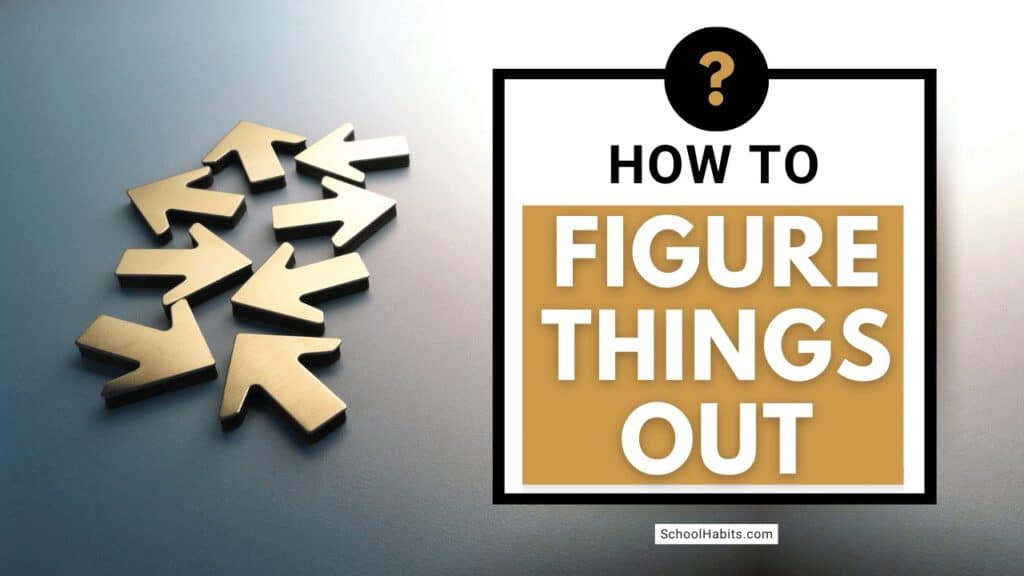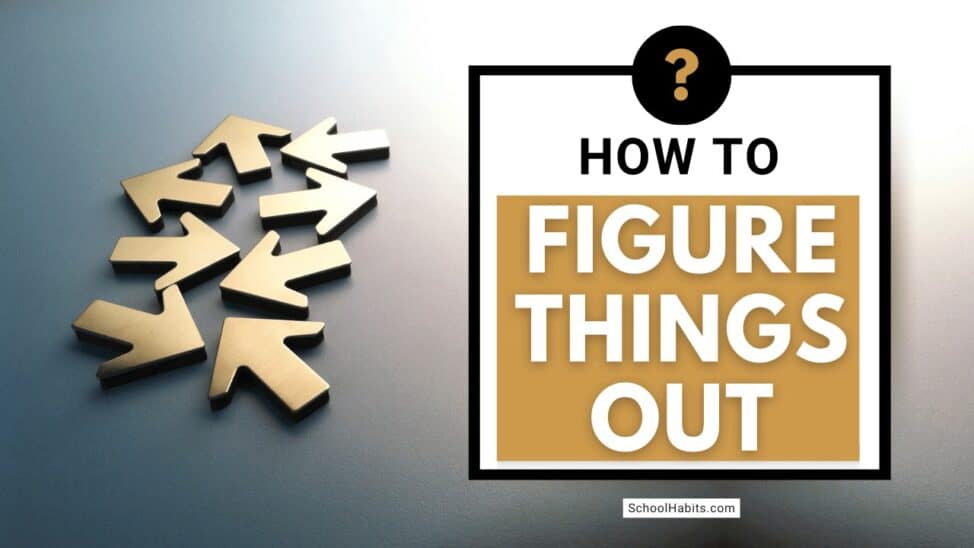By Katie Azevedo, M.Ed.
Knowing how to figure things out is one of the most valuable skills you can have as a student. (And also as a working professional and human, really.) The ability to figure things out is called resourcefulness. Resourcefulness is a superpower.
As a student, you will constantly be asked to do things that are hard to do. Sometimes, your teachers and professors will explain the steps you need to take, but sometimes figuring out the steps is entirely up to you.
As you progress in grade levels, the expectation that you will figure things out on your own increases. If you don’t learn how to be resourceful in school, life can feel difficult.
Signs that you need to become more resourceful
Not knowing how to figure things out on your own can impact many areas of school and work. Some classic signs that your “I can figure it out” muscle is weak are the following:
- You regularly feel that other people around you know something you don’t know
- You often repeat to yourself that you could have been successful if only “_____” (fill in the blank with an excuse)
- You avoid doing things because you don’t know how to do them
- You stop working on something when you’re not sure what the next step is
How to figure things out: 5 strategies
The following 5 strategies show you best practices for how to figure things out when you get stuck. The strategies are for students, but they apply to working professionals as well.
1. Start somewhere
You have to start something in order to know you’re stuck. Even if you don’t know exactly where to start, beginning somewhere gives you feedback. For example, if you have to write a history paper on a topic of your choice, and you don’t know what to do or where to start, begin by flipping through your notes to remind yourself of the recent topics you’ve covered in class. WWII? Great. Let’s start with that. What do you want to write about WWII? Don’t know? Fine, Google “essay topics about WWII.” (This is also strategy #3.) If you hadn’t begun by just flipping through your notes, you never would have arrived at the idea to do something about WWII.
2. Try to identify the Wall
The Wall is the exact point you get stuck and can’t move any further. It’s the point where you have two choices: 1) stop and quit altogether, or 2) figure out how to take the next step.
Students are often too quick to say “I don’t get it!” and give up. But in reality, they know way more than they give themselves credit for. Take Zach, for example. Zach is working on math problems for homework. He gets to the middle of question 4 out of 10, and throws down the pencil in frustration because he doesn’t know what to do.
Oh, Zach! He does know something!” He knew how to do questions 1-3, and then half of 4. The WALL was somewhere in the middle of question 4. If Zach can pinpoint the exact step he got stuck on, then that’s what he would look up in his textbook, Google, or ask his teacher about.
Hey, in case this is helpful, here’s my step-by-step tutorial for what to do when you fail a test. It’s 100% related to how to figure things out, just in the context of … well, failing tests.

3. Google it
When you don’t know how to do something, Google it! You can find out how to do nearly anything by Googling “How to ____.” YouTube is just as helpful. Go to YouTube and search for what you want, and there you go.
Let me give you a real-life example. Some variation of the following scenario has happened multiple times over the past few years:
Ana comes to my office, disappointed that she lost points on her essay for not having the proper MLA header. When I asked why Ana didn’t use the right MLA header, she said “because I didn’t know how to and my teacher didn’t show us.”
Oh, Ana.
This gets me every time. A simple Google search for “MLA header format” gives the answer in 2 seconds, and could save Ana 5 essay points.
Let’s look at another example:
Chris uses an iPad with the Notability app to complete worksheets and do work digitally. (Awesome. This is very common.) For one particular assignment, Chris was required to complete something in Notability and then email it to the teacher instead of submitting it through his learning portal as usual…
Chris completed the assignment but did not email it to the teacher. He lost points … He said he didn’t know how to get something from Notability into his email…
A simple Google search for “How to email something from Notability” would have given him the answer in seconds.
4. Check your resources
Your school resources include class notes, teacher notes, teacher slides, learning materials posted by your teacher, textbook, handouts, etc. If you don’t know how to do something, and Googling it didn’t help, check your resources.
- Doing a math problem for homework and get stuck on step 3? Look at your notes.
- Writing an essay and forget what exactly is required? Check the rubric.
- Studying for science and forget the differences between two biological terms? Look at the slides your teacher posted to Google Classroom.
As a student, you have so much information at your disposal. Teachers don’t give you these resources for fun and giggles: it’s all there for you to use.
5. Try again
Knowing how to figure things out goes hand in hand with trying again. And again. And again. When we don’t know something and make an effort to figure it out on our own, we are likely to make mistakes and get it wrong. This is normal and you should expect it. If you try something and it doesn’t work, try something else. Do another Google search. Watch a different YouTube video. Take a break and think it over and come back and try again.
How to figure things out: Conclusion
The ability to figure things out is connected to self-confidence and resilience. There is an answer out there. You are capable of finding it. Failing once doesn’t mean failing forever. These are essential beliefs that you need to buy into before you ever succeed in figuring something out.
More resources about figuring things out and self-advocacy:
- How to ask for help in school
- Life skills all students need to be functioning adults
- How to do a student self-assessment
- How to make decisions: 4 decision-making strategies for students


